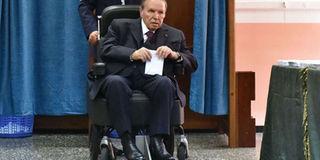Algeria's Bouteflika, political survivor after 20 years at helm

Algerian President Abdelaziz Bouteflika is seen on a wheelchair as he votes at a polling station in Algiers, May 4, 2017. PHOTO | RYAD KRAMDI | AFP
What you need to know:
- Mr Bouteflika, who turned 82 on Saturday, has changed campaign manager and had his registration submitted at the 11th hour.
- President Bouteflika has rarely been seen in public since suffering a stroke in 2013 that impaired his speech and forced him to use the wheelchair.
- Known for wearing a three-piece suit even in the stifling heat, he gained respect from many for his role in ending the civil war, which official figures say killed nearly 200,000 people.
- Critics argue that uncertainty over President Bouteflika's fitness for a fifth term -- and speculation over possible successors -- has frozen the government.
ALGIERS,
Abdelaziz Bouteflika, Algeria's longest-serving president and a veteran of its independence war, is a political survivor battling to stay in power despite ailing health after two decades at the helm.
Mr Bouteflika, who turned 82 on Saturday, has changed campaign manager and had his registration submitted at the 11th hour, for the country's April 18 presidential poll, from a hospital bed in Switzerland where he has been undergoing "routine medical tests".
The President, who uses a wheelchair, vowed in a letter read out on state television Sunday to organise a "national conference" if re-elected that would set a date for further polls which he would not contest.
"I pledge not to be a candidate in that election which will ensure I am succeeded in undeniable conditions of serenity, freedom and transparency," he wrote in the face of massive demonstrations against his candidacy for a fifth term in office.
STROKE
President Bouteflika has rarely been seen in public since suffering a stroke in 2013 that impaired his speech and forced him to use the wheelchair.
But even before his stroke, he had repeatedly marked himself out as a wily political survivor.
When he came to power 20 years ago, with the support of an army battling Islamist guerrillas, nobody expected him to stay in office for so long.
But "Boutef", as many Algerians nickname him, was instrumental in fostering peace after a decade-long civil war in the 1990s.
"I am the whole of Algeria. I am the embodiment of the Algerian people," he said in 1999, the year he first became President.
He has had a long battle with illness and frequently flown to France or Switzerland for treatment.
CIVIL WAR
Known for wearing a three-piece suit even in the stifling heat, he gained respect from many for his role in ending the civil war, which official figures say killed nearly 200,000 people.
But he has also faced criticism from rights groups and opponents who accuse him of being authoritarian.
After his stroke, President Bouteflika consolidated power in a country where the shadowy intelligence service has long been viewed as a "state within a state".
In early 2016, he dissolved the all-powerful DRS intelligence agency after dismissing its leader General Mohamed Mediene, known as "Toufik", who had clung to the post for a quarter of a century.
THE BEGINNING
Mr Bouteflika was born in Morocco on March 2, 1937 to a family from western Algeria.
At the age of 19, he joined the National Liberation Front (FLN) in its struggle against the French colonial rulers.
When independence came in 1962, he was appointed minister of sport and tourism at the age of just 25, under Algeria's first post-independence president, Ahmed Ben Bella.
The following year he became foreign minister, a post he held for more than a decade.
But he was sidelined after the death of president Houari Boumediene in 1978 and went into self-imposed exile.
RECONCILIATION
While he was abroad, the military-backed government cancelled 1991 elections which an Islamist party had been poised to win. That sparked a decade of bloodletting.
Mr Bouteflika returned from Switzerland in 1999 to stand for President, with the backing of the army, which saw him as a potential figure of reconciliation.
He proposed an amnesty for rebels who laid down their arms and twice secured public endorsement for "national reconciliation" through referendums.
The first, in September 1999, was a major gamble -- but it paid off, leading to a sharp decrease in violence that helped propel Bouteflika to a second term in 2004.
A constitutional amendment was required to allow him to stand for a third term, which he won in 2009.
EMERGENCY
When the Arab Spring erupted in January 2011, Mr Bouteflika rode out the storm by lifting a 19-year state of emergency and using oil revenues to grant pay rises.
His supporters argue that under his stewardship, public and private investment has created millions of jobs and dramatically lowered unemployment.
But a lack of opportunities and high youth unemployment keep driving many Algerians to seek a better life abroad.
In April 2013, the President was rushed to hospital in France after his stroke, and spent three months recovering.
He had already been hospitalised in Paris in 2005 because of intestinal problems, and in early 2006 spent a week undergoing post-operative medical tests at the same hospital.
HEALTH
Already back in 2014, President Bouteflika's decision to seek a fourth mandate after 15 years in power sparked both criticism and derision from opponents, who questioned his ability to rule.
He did not even campaign, casting his vote from a wheelchair, but still officially won 81 percent of the vote.
There has been constant speculation over his health and his fourth mandate has been marred by falling oil prices, exposing the country's heavy dependence on hydrocarbons.
Critics argue that uncertainty over President Bouteflika's fitness for a fifth term -- and speculation over possible successors -- has frozen the government.





